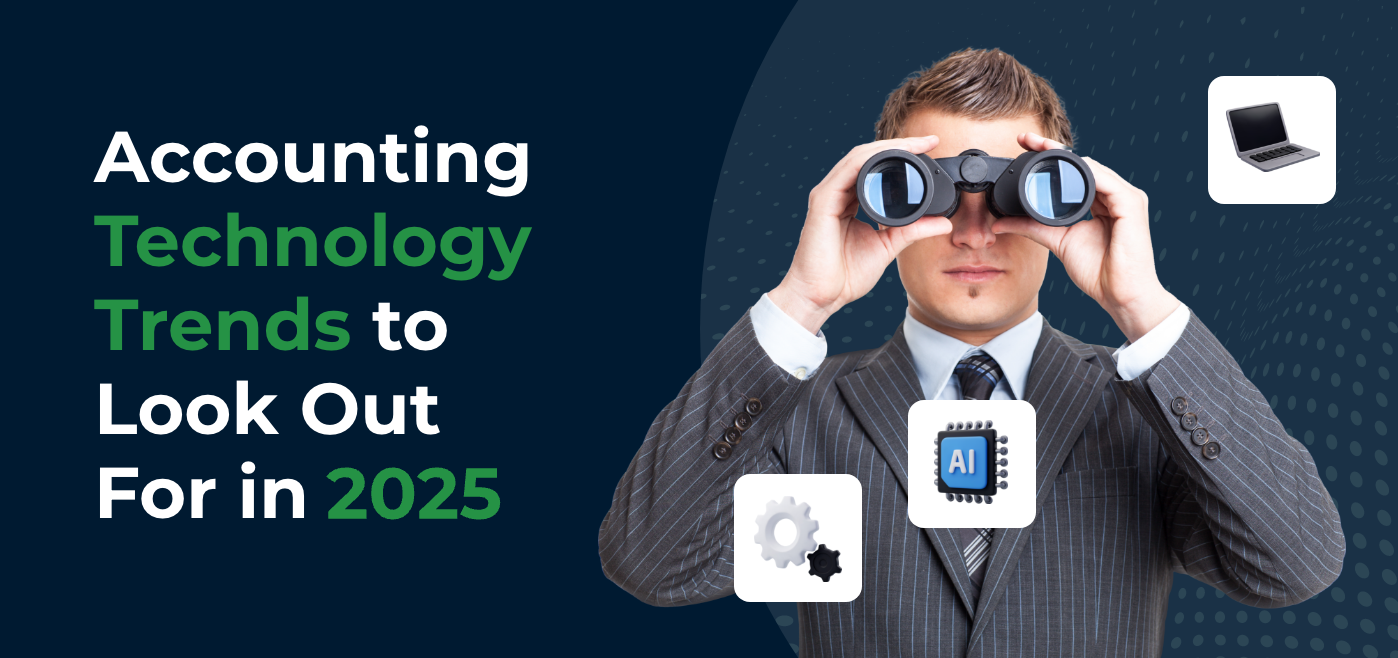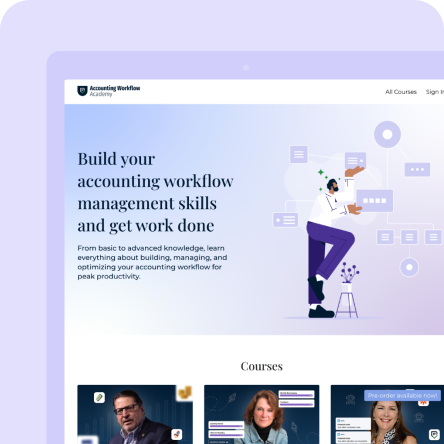Years back, many accounting firm owners deemed technology too expensive, complex, or unnecessary.
But that’s no longer the case in today’s rapidly evolving digital world. Many now believe using advanced AI and automation tools is crucial to their firm’s success. And there’s data to back it up.
According to the 2023 Intuit QuickBooks Accountant Technology Survey, accountants plan to spend an average of $15,800 on technology improvements and upgrades over the next year.
What does this indicate?
The accounting industry is not just adapting but actively embracing technological advancements.
Firm owners like you are setting aside large budgets to automate their services and explore new software to help them stay ahead of the competition. We bet you don’t want to be left behind.
In this article, we’ll explore some emerging accounting technology trends that could further revolutionize the industry in 2025 and how you can leverage them to scale your practice.
What is Accounting Technology?
Accounting technology refers to systems, software, and applications firms use to automate financial processes such as data entry, payroll processing, client onboarding, and reporting.
Using these tools to streamline your business operations helps to save time, reduce overhead costs, minimize errors, and boost productivity.
Also, automating recurring tasks frees up time to focus on higher-value activities and take on more strategic roles in your firm. No wonder 86% of accountants believe using accounting technology will drive business growth.
2025 Accounting Technology Trends
- Accounting Automation
- Artificial Intelligence (AI)
- Cloud accounting technology
- Blockchain Technology
- Data Analytics and Forecasting Tools
- Remote Work and Collaboration Tools
- Data Security
- Accounting Workflow Automation
- Chatbots & Robotic Process Automation (RPA)
1. Accounting Automation
Automation in accounting isn’t new but we’ve seen a tremendous shift towards its adoption in the last few years. And the reason isn’t far-fetched.
It has empowered many accountants, bookkeepers, and auditors. They no longer need to rely on papers, spreadsheets, and other traditional tools to perform their duties.
Using accounting automation tools that can automate recurring time-consuming tasks such as data entry or payroll helps to:
- Save time
- Reduce cost
- Cut human errors
- Improve efficiency
- Foster collaboration
- Increase productivity
But here’s the kicker: We’ll surely see more accounting automation software in 2025. So firms that currently don’t automate tasks risk falling behind their competitors and failing to grow their business.
Licia Salice-Jarisch, SVP of Finance at Binary Fountain shares the same opinion in this Forbes article:
Today’s financial technology provides instant billing and reporting functionality and reduces the chances of human error. In the future, I believe finance will become increasingly automated. The organizations that wait to automate their financial processes will find it hard to grow and scale their business. Finding ways to seamlessly integrate new technology that blends well with your existing business diagnostics and general financial system is key."
2. Artificial Intelligence (AI)
According to Markets and Markets research, AI in accounting market size is expected to reach $4.791 billion, growing at a CAGR of 48.4% in 2025.
This significant growth, a remarkable increase from $666 million in 2019, indicates a widespread adoption of AI technologies in the accounting industry.
In 2023, ChatGPT in accounting showed us why this adoption is moving at such a rapid pace. Its ability to automate repetitive tasks, streamline accounting workflows, and provide valuable insights made it an invaluable tool for accountants.
So it’s not surprising that in a recent Gartner poll of more than 2,500 executive leaders, 45% of them said that hype around ChatGPT prompted them to increase AI investments.
What’s more, some accounting software companies like Financial Cents have integrated ChatGPT with their platform. This powerful combination helps firm owners improve efficiency, attract new clients, develop business strategies, and increase profits.
As a result, accounting firms that harness the power of AI tools have a higher advantage over their competitors because they can provide their clients with high-level advice, risk assessments, and business strategy consultations. Here’s a list of the best accounting AI tools to use in your firm in 2025.
In 2025 we expect to see more AI software with deeper use cases. Will there be a bigger tool than ChatGPT? Time will tell.
3. Cloud accounting technology
Back in the day, accountants were always buried in paperwork, surrounded by stacks of ledgers, journals, and calculators. Every transaction required manual entry, and collaboration was limited to in-person meetings.
Fast forward to the present day: Cloud technology has transformed tedious manual processes into a streamlined, efficient, and collaborative experience. That’s why it’s fast gaining prominence in the accounting industry
With cloud technology, you can access financial data from anywhere, collaborate in real-time, automate routine tasks, and create reports in a few clicks.
Also, you can serve clients virtually from anywhere in the world, reducing dependency on time, money, and location constraints.
In 2025, we expect to see more innovative cloud-powered software in the accounting industry to help enhance security, increase efficiency, and improve collaboration.
4. Blockchain Technology
When you hear blockchain, Bitcoin, Ethereum, and other cryptocurrencies immediately come to mind. Crypto taxes are also becoming increasingly relevant, which is a topic for another day.
However, blockchain technology has evolved far beyond cryptocurrencies. It’s a decentralized ledger system that enables transparency, immutability, integrity, and accuracy of transactions across a network of computers.
Research shows the accounting blockchain market is projected to reach an estimated $868 million in 2025. This rapid growth portrays blockchain’s widespread adoption in the accounting sector.
In short, some accounting and auditing firms like the Big Four are already implementing blockchain technology.
Though it’s still an emerging technology, it’s only a matter of time before more accounting firms recognize the benefits of blockchain such as:
- Immutable ledgers
- Streamlined auditing processes
- Reduced fraud risks
- Reduced business costs.
- Automate routine accounting tasks like payroll, data entry, and reconciliations with smart contracts
In addition, the distributed, tamper-proof ledger offers an invaluable level of irreversibility and traceability that only a handful of systems can match when dealing with sensitive financial data.
Therefore, as we edge closer to 2025, we will undoubtedly see more companies exploring blockchain solutions as a way to improve their financial transparency and operational efficiency.
5. Data Analytics and Forecasting Tools
Imagine you could travel to the future to access valuable financial insights about your company. We bet you’d do things differently with the knowledge you’ve gained on your return.
Data analytics and forecasting tools may not be as accurate as going into the future. But they are the next best thing to help accountants uncover crucial insights, identify historical patterns, monitor financial health, and make accurate future projections.
This results in strategic planning, and proactive financial management and ensures you make informed business decisions for you and your clients, especially during these uncertain times.
Accountants who harness the power of data analytics can:
- Optimize cash flow management
- Identify cost-saving opportunities
- Improve investment decisions
- Develop strategic growth plans based on predictive analysis
As AI and automation software take over mundane tasks, we expect accounting professionals to focus more on higher-value activities such as reviewing and interpreting data, business advisory, and delivering actionable insights to clients in 2025.
Mrs Anna Yap-Too Siew Hong, Director, School of Business & Accountancy, Ngee Ann Polytechnic corroborates this point:
Technology and Big Data are playing an increasingly greater role in businesses. The Accountant has to be strategic, creative, analytical, and data-savvy. The Accountant must be able to visualize data, draw relationships from various sources, and present the data for decision-making and strategy formulation. Programming and coding may also be the norm one day. The computer language used is not important, but the skill to begin with the end in mind, the logical thought process, the mindset of crafting multiple creative scenarios, will ensure that the Accountant is constantly looking for opportunities to lead innovation and drive performances."
6. Remote Work and Collaboration Tools
Many industries had started experimenting with remote work long before COVID-19. However, the pandemic accelerated its adoption as people had to work from home due to social distancing.
Over three years later, remote work – whether full or hybrid – is now the new normal.
Advances in AI, cloud, and automation technologies have ensured working remotely is not just a fad but a viable and efficient option for teams.
In a FlexJobs’ 2022 Career Pulse Survey, 62% of respondents prefer full-time remote work while 32% prefer hybrid. The reasons are obvious.
Working remotely enables flexibility, enhances productivity, reduces transportation and infrastructure costs, and promotes a healthier work-life balance.
Sarah Sutton, Founder and CEO of FlexJobs shared a similar opinion in this PR Web article:
Across industries, companies and workers have experienced the valuable benefits remote work brings. As a result, the widespread interest and adoption of remote-friendly practices are clear signals that remote work's lasting impact on the world of work will be felt well into 2023 and for many years to come."
Accounting and finance stand prominently among the top careers for remote work. Also, accountants are highly sought-after roles for remote employment. Which answers the question “Can accountants work from home?“
Without a doubt, remote work is here to stay in the accounting industry and collaboration tools such as Financial Cents will play a major role in ensuring its success.
More accounting firms will adopt this trend in 2025 and prepare their tools, systems, and processes for a productive remote working environment.
7. Data Security
Did you know that the global average cost of a data breach in 2023 was $4.45 million according to an IBM Data Breach Report?
This highlights the importance of data security in our increasingly digital world.
Accounting firms process and store sensitive client information. Any exposure could lead to data loss, litigation costs, sanctions, and a tainted business reputation.
That’s why companies are investing more in data security, like encryption and backup recovery. These measures protect against loss, hacking, data theft, phishing, and ransomware attacks.
Another emerging trend is “security by design” where security measures are included from the software’s initial stages rather than as afterthoughts.
In 2025, more accounting firms will use AI and automation to improve their defense, detect threats, predict attacks, and respond quickly.
8. Accounting Workflow Automation
As an accountant or bookkeeper, your job requires you to handle different workflows such as client onboarding, year-end review, or filing tax returns.
Manually managing all these tasks is overwhelming, time-consuming, and less efficient. 66.7% of accounting and bookkeeping firm owners surveyed in our 2023 State of Accounting Workflow Report attributed workflows as the biggest challenge they faced.
So the need for accounting workflow automation software cannot be overstated. Automating these routine tasks saves time, minimizes errors, and increases efficiency.
While some firm owners have fully embraced automation, others are still on the fence about this transformation.
Ryan Lazanis of Future Firm explains why in the aforementioned workflow report:
While most firms want to leverage workflow automation to drive inefficiencies, most have a hard time getting there. That’s because they haven’t adequately systematized the critical areas of the business model. Once you’ve systematized your who (your clients) and your what (your packages and pricing), systematizing your how (your processes) becomes infinitely easier."
By 2025, we predict more firms will be able to systematize their how and embrace workflow automation software as the benefits are too obvious to ignore.
9. Chatbots & Robotic Process Automation (RPA)
Gone were the days when clients had to wait endless hours on the phone or join long queues at physical offices to make inquiries or lay complaints.
This led to endless frustrations and resulted in clients looking for brands that offered better customer service.
But today’s consumers are using self-service options such as online knowledge bases, chatbots, or FAQs to find information and solve problems. And this trend is set to continue in 2025 and beyond.
Anthony Mullen, senior research director at Gartner says:
The reality is that customers have to engage with endless digital activities over their lifetime, which means much more data to consider. The trend of customers assigning their endless digital activities to their virtual personal assistants (VPAs), chatbots, and other self-service tools will grow over the next 10 years."
In other words, accounting firms will have no choice but to turn to chatbots and RPA to help with customer support.
While RPA can handle routine tasks like invoice processing, account reconciliation, and data entry, chatbots can effortlessly deal with customer queries through scripted interactions.
As a result, accounting firms will be more productive, make fewer mistakes, and provide better customer service.
You may be interested in:
A Comprehensive Guide to Build Your Accounting Firm Tech Stack
Preparing for 2025 and beyond
Let’s face it. The accounting technology world is evolving at breakneck speed. Therefore, accountants and bookkeeping professionals should embrace these trends to remain competitive or risk falling behind.
Here are five ways to help prepare you for the future:
- Stay up to date with the latest accounting news & trends
- Regularly participate in relevant professional training and workshops
- Network with industry peers and experts to gain valuable insights
- Experiment with new technologies to see what works best for your accounting firm
- Always ensure that your approach complies with regulatory standards
Remember, technology is a tool to enhance your firm’s operations, not a threat.
Keep up with it to save time, increase efficiency, offer better services to your clients, and stay ahead in this competitive business environment.
Use Financial Cents to Manage Your Workflow Automation, Team Collaboration, and Your Firm
If you’re a solo entrepreneur, traditional methods for running your accounting firm may be enough at first. But as your client base grows, so will your administrative tasks. As such, the need to build an accounting tech stack becomes imperative.
However, deciding which accounting tools are best for your practice can be overwhelming due to the many options available.
So rather than subscribing to various software, your best bet is an all-in-one solution like Financial Cents.
Financial Cents is a tool that innovative accounting and bookkeeping firm owners use to automate workflows, collaborate with staff, and stay on top of their financial processes.
Here are great ways Financial Cents can help you automate your firm:
- Workflow automation: Financial Cents offers robust features in its workflow management software that allows you to automate routine tasks, collaborate with your team, and increase your firm’s productivity.
- Artificial intelligence integration: Financial Cents’ integration with ChatGPT enables you to automate recurring tasks. For instance, you can create workflow checklist templates such as Monthly Bookkeeping or client onboarding and generate email templates.
- Zapier integration: You can connect Financial Cents with many other apps in your tech stack using Zapier, from CRM, and email clients, to project management tools.
- Team collaboration: Context switching is a productivity killer. With Financial Cents, you don’t have to juggle multiple tools to collaborate with other team members. You can share files, assign tasks, communicate, and track progress all in one app.
- Firm management: Financial Cents makes it easy to manage all aspects of your accounting firm: from tracking deadlines, automating workflows, and managing clients to collaborating with your staff all in one app.
Use Financial Cents Accounting Practice Management Software to manage your firm.








